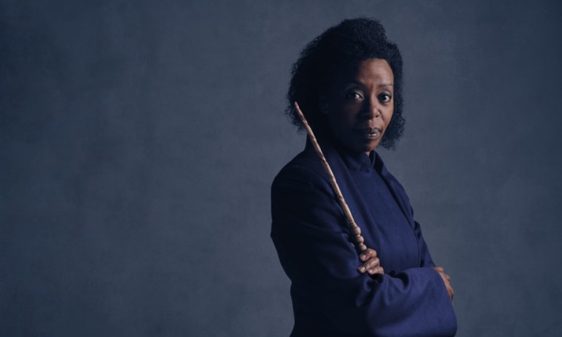
Shrijana Khanal is a Student Staff member at the Women’s Center. She is an Economics major with minors in Computer Science and International Relations. Shrijana is a co-facilitator of Pop Culture Pop-Ups at the Women’s Center.
As my fingers traced the glazed, gold-plated title of Harry Potter and the Deathly Hallows for the seventh time, I felt the same rush of euphoria, nostalgia, and bittersweetness that I did when I read the books for the first time as an eager seven-year-old girl. The Harry Potter series became my refuge during the dark times in my life: an escape from reality and sad thoughts. At the quick turn of a page, I would be transported into another world: a place filled with adventure, love, and friendship. One of my favorite parts of reading the series was my quick attachment to the characters. The character that stuck with me the most was Hermione, the fearless, smart, and empathetic female member of the golden trio. She became my fictional shero at a young age, and remained this way as I grew up. Hermione taught me that girls can be studious, warriors, and social activists all at once.

How many times did Hermione save Harry and Ron’s lives? Without her, they would have been slaughtered in the first book. There would be no story to tell about the Boy Who Lived without Hermione. I always admired her for her bravery and wit, whether in the classroom or the battlefield. She was not afraid to be herself. Despite being labeled a “bookworm,” “bossy,” and a “nightmare,” Hermione never abandoned her true qualities. She fought for herself and others along with what she believed in. As a young girl trying to maneuver through a harsh world, Hermione gave me the power to stay true to my values. She taught me that reading books and being the highest-achieving student in your class is cool, and something to be proud of. Hermione gave me the courage to take a stand for issues that were dear to me. She showed me that having emotions is not a bad thing. Most importantly, in a world that is always trying to tear you down, deter you from following your goals, or even presumptuously label you, being an unapologetic girl was the most positive, life-changing thing that could happen to me. For me, Hermione was the best friend and role model I needed.
I saw myself in her; she gave me the confidence to be who I am, a young outspoken, nerdy, and caring woman. Unknown to me at the time, she also gave me the confidence to be a feminist.
Being a woman of color, Harry Potter made it difficult for me to connect with the characters based on race alone, since the series only contained the bare minimum of diversity. However, I did not need race to feel a connection with Hermione. I felt connected with her through her qualities of being studious, kind, and brave. I could easily identify with Hermione because she was not perfect to begin with: she had to go through awkward transitions and transformative setbacks to fully grow. Her development from an “insufferable know-it-all” to a brilliant heroine made her an authentic character.

However, others may have not have felt this connection with Hermione as I did. Rowling shared that she made the character racially ambiguous on purpose after people were angry that a black actress was cast as Hermione in a London stage production of Harry Potter and the Cursed Child. Rowling supported her claim by referencing Hermione’s frizzy hair and ambiguous skin color. The concept of a minority playing Hermione is something that makes me immensely happy, but why did it take so long for Rowling to highlight this fact, and for others to accept it? Is the concept of a female lead being played by a woman of color too absurd to digest? For me, this is not feminism. A white girl is not the only person with the power to possess the positive characteristics I saw in Hermione. It is important to see color, because not seeing race devalues what women of color have to offer.

Although the series was published 10 years ago, it is still relevant to my life and the lives of others (even with its sometimes problematic stances). Personally, I still revisit the books whenever I go through a tough change in my life, as a coping mechanism. Discussing the issues of the series forces me to grow from the innocence I had in my childhood while reading it for the first time. But through everything, Hogwarts will always be there not only to teach you to see the magical and real world differently, but to welcome you home each time.
Click on the links below to learn more about the topics discussed in this blog!
Importance of intersectional feminism
https://everydayfeminism.com/2015/01/why-our-feminism-must-be-intersectional/
How many times Hermione saved Harry and Ron’s lives
JK Rowling Loves Black Hermione Casting In ‘Harry Potter And The Cursed Child’





